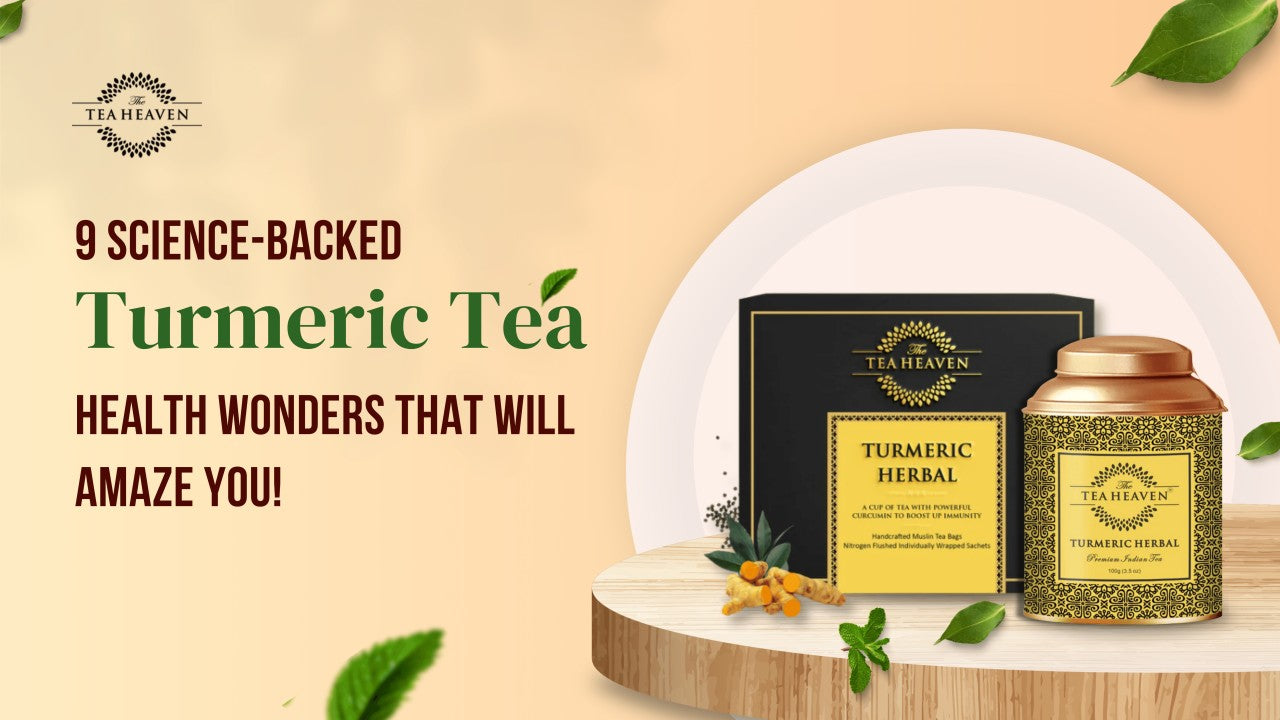Turmeric, a beloved spice renowned for its vibrant color and distinct flavor, boasts a rich history spanning millennia. Derived from the root of the Curcuma longa plant and belonging to the Zingiberaceae family, alongside ginger, turmeric's origins are deeply rooted in Southeast Asia. Utilized as a health supplement for over 4,500 years, it has played a vital role in Ayurvedic and Chinese healing practices.
Its journey traces back to India, where it became integral in culinary practices. Among its Ayurvedic advantages, turmeric tea is purported to bolster the immune system, safeguard the liver, and aid in managing arthritis. India cultivates 78% of the world's turmeric supply. This article explores the various potential health advantages associated with consuming turmeric-infused tea.
Table of Content: |
What is Turmeric Tea?
Turmeric tea is similar to ginger tea. It is prepared by steeping either fresh or dried turmeric in water, resulting in a beverage that typically showcases hues of yellow, orange, or golden, accompanied by an earthy flavor profile complemented by a spicy kick, often described as both bitter and sweet.
The primary active ingredient in turmeric, curcumin, is known for its anti-inflammatory and immune-boosting properties. However, curcumin exhibits low bioavailability, making it challenging for the body to access and absorb. Consequently, turmeric supplements, which offer concentrated curcumin levels, have gained popularity.
There exist various methods for brewing Turmeric spiced herbal tea:
- Using grated turmeric root
- Using pure turmeric powder
- Store-bought turmeric tea, available in loose-leaf form or in tea bags.
8 Amazing Health Benefits of Turmeric Tea
-
A Beneficial Source of Various Nutrients
Turmeric is recognized as a good source of several nutrients, with curcumin often taking the spotlight in discussions of its health benefits. However, turmeric and turmeric tea offer more than just curcumin. For instance, one teaspoon (3 grams) of dried turmeric, a quantity commonly used to prepare a cup or two of turmeric tea, also provides notable amounts of other nutrients, including:
- Manganese: 26% of the Daily Value (DV)
- Iron: 9% of the DV
- Copper: 4% of the DV
-
Anti-Inflammatory Power and Immunity Booster
One of the most well-known benefits of turmeric tea is its potent anti-inflammatory properties. Curcumin, the active compound in turmeric, has been extensively studied for its ability to reduce inflammation in the body. Chronic inflammation is linked to various health problems, including heart disease, cancer, and arthritis.
Regular consumption of turmeric tea can help combat inflammation and potentially lower risk of developing conditions.
Moreover, the antioxidants present in curcumin present in turmeric can enhance the immune system. It can also function as an immune modulator, assisting in the regulation of immune cells.
-
Loaded with Bioactive Compounds
Turmeric tea contains a variety of bioactive compounds, which are nutrients that contribute to human health. These encompass well-known vitamins and minerals, along with lesser-known substances like polyphenols and volatile oils.
Among these bioactive compounds, curcuminoids, notably curcumin, stand as the primary group found in turmeric tea. However, the beverage also harbors hundreds of additional bioactive compounds, including various volatile essential oils and diverse types of antioxidants.
-
Aids in Weight Loss
Turmeric tea is recognized for its positive impact on the digestive system, which plays a crucial role in weight loss efforts. Additionally, its anti-inflammatory properties aid in suppressing the proliferation of fat cells. Moreover, turmeric tea contributes to weight loss by regulating blood sugar levels, thereby reducing the risk of insulin resistance.
-
Lowers the Risk of Cardiovascular Diseases
Several studies have demonstrated the beneficial effects of curcumin on heart health, attributed to its antioxidative and anti-inflammatory properties. Research indicates that curcumin may assist in thinning the blood, lowering cholesterol levels, and preventing the narrowing of arteries. These effects can provide a protective shield against various cardiovascular issues.
Additionally, curcumin may aid in minimizing the aftermath of different types of heart damage.
-
Assists in Managing Irritable Bowel Syndrome (IBS)
Curcumin has been a traditional remedy for various digestive ailments for a considerable period. Studies from reputable sources indicate that its antioxidant and anti-inflammatory characteristics can influence gut bacteria.
Nevertheless, further investigation is required to ascertain the potential effects of curcumin on conditions like irritable bowel syndrome (IBS) and other inflammatory intestinal disorders, including Crohn’s disease and ulcerative colitis.
-
Contributes to Cancer Prevention and Management
One of the extensively recognized therapeutic attributes of curcumin is its anticancer efficacy. Due to its antioxidative and anti-inflammatory properties, curcumin is believed to mitigate the likelihood of cellular damage, thereby reducing the risk of cell mutations and cancer development.
Moreover, multiple studies have demonstrated curcumin's antitumor effects, impeding tumor growth and the metastasis of cancerous cells.
Researchers are presently exploring the potential use of curcumin in cancer treatment in conjunction with chemotherapy and radiation therapy.
-
Guards Against Liver Damage
In a study conducted in 2016, researchers discovered that turmeric extract and curcumin provided significant protection against liver injury. The gathered data-informed scientists that turmeric effectively shields the liver from chronic damage by reducing hepatic oxidative stress. This reaffirms the notion that oxidative stress plays a pivotal role in numerous illnesses, and turmeric serves as a potent supplement in combating it.
Given that the liver is one of the body's largest organs, performing crucial metabolic functions, safeguarding it against damage is a wise investment in one's health and overall well-being.
-
A Fantastic Tea Before Bed
Turmeric tea in its plain form is caffeine-free, making it an excellent choice for consumption during the late afternoon or evening without causing disruptions to your sleep cycle.
Additionally, it complements other non-caffeinated teas like chamomile.
However, turmeric tea is commonly incorporated into blends with caffeinated green or black tea varieties. If you prefer to enjoy turmeric tea without the stimulating effects of caffeine, ensure to select a caffeine-free option.
.
How to Prepare Turmeric Spiced Herbal Tea?
Depending on personal preferences, there are several variations in preparing turmeric tea. Below is a simple recipe to make this comforting beverage. It's worth noting that you can use either fresh turmeric root or dried turmeric powder.
Ingredients:
- Tea Heaven’s Turmeric Spiced Herbal Tea (Contains ginger, cinnamon and black Pepper)
- 1–2 cups of water
- Honey
- Lemon to taste
Directions:
- Bring the water to a boil in a pot.
- Add Tea Haven’s Turmeric Spiced Herbal Tea.
- Reduce the heat and let the mixture simmer for about 5 minutes.
- Strain the tea.
- Add honey, or lemon, according to taste.
- Allow your turmeric tea to cool until it's suitable for drinking. It's not only delicious, but research also indicates that boiling turmeric doesn't diminish its antioxidant activity.
How Many Cups of Turmeric Tea can be Consumed Daily?
There is no set daily recommendation for turmeric intake. Depending on the specific condition being addressed, the suggested amount may vary. According to available research, most studies involving adults recommend a daily intake of 400–600 milligrams (mg) of pure turmeric powder, taken three times a day.
Overall, research indicates that curcumin doses ranging from 4,000 to 8,000 mg per day, and in some cases up to 12,000 mg per day, are considered safe. If you are a latte person, you can also make yourself a Turmeric Latte .
For ensuring product purity, grating the turmeric yourself is recommended with certain medications.
Wrap Up
If you're seeking a distinctive and nutritious beverage to incorporate into your daily routine, turmeric tea could be an excellent choice.
For many individuals, indulging in a cup of turmeric tea becomes a delightful ritual. Not only is the tea low in calories and caffeine-free, but it also exhibits promising health benefits in laboratory studies, although further research is warranted.


